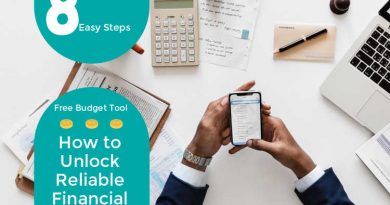Financial Security: 8 Steps to Save Money and Build Wealth
Financial security is something everyone would like to have. It’s not easy to achieve, but it is possible. No matter what your income level is.
At present, Covid-19 is deeply affecting the economy. For nearly everyone around the world. Admittedly, my skeptical viewpoint leads me to a conviction that not everyone is suffering. Well, not financially anyway. Since that’s not the focus today I’ll move on. I do try to keep my opinions a little more to myself. Especially in these times where being in disagreement means people are enemies. Can’t say I have enemies, or at least anyone that I see as an enemy.
Moving on…
Step One…. Understand What it Means
Financial Security For You
Ever thought about ‘rich people’ and what it must be like to be them? It’s okay… we all have. The thing is, for the most part it’s all about optics. In my own life, I have had the experiences of both poverty and financial security. I have people I know very well who I perceive as ‘rich’ in my life also.
What I have learned is this: ‘rich’ people are often simply deeper in debt than the rest of us. Those big houses are mortgaged to the hilt, the fancy cars are never paid for (there is a tendency to get a newer and better car every so often, can’t be messing up those optics), and everything is bought on credit. No idea how those people ever retire, to be honest.
To understand financial security, you need to recognize it does not at all require a big paying job, tons of income or even a rich uncle. Financial security is a peaceful state where we don’t have to constantly worry about money. Yes, that is a real thing!
Financial security does not mean we are rich, it simply means we have a plan, are working toward it and don’t constantly have to worry.
Step Two…. Evaluate Your Bills and Debt
Don’t skip step two. It’s a seriously important and required action to get to financial freedom.
We’ve discussed budgets before, so if you have been a long time Zoo patriot you may have seen (and hopefully taken the time to read) some of our posts. If not, no worries, you can check them out. I recommend our post that includes a free budget tool! That post includes everything you need to make a budget.
However, I will say here that for this part write down every bill (you can do a high estimate for recurring bills that vary) and all of your other expenses, this includes habits. Mine would be smoking (don’t judge), my chocolate habit, charity work (see some are good), eating out and so forth. Make a separate list for any debts you need to pay but aren’t paying on at the moment. All of them.
Step Three…. Don’t Panic. You Got This!
Anxiety is real. It’s something we all deal with on varying levels, there are posts around the Zoo, as it is sadly a part of All Things Life for sure. However, that budget does not need to cause panic. You got this. Just breathe. If it helps, step away for a bit and get something in that makes you relax (exercise, long bath, hug your babies, whatever works and is healthy) then come back to it. This is a process and it can be a tough one.
Keep on with the steps, you can and will get there.
 Step Four…. Make a Plan
Step Four…. Make a Plan
Now that you’ve calmed down (you didn’t skip step three, right?), it’s time to make a plan.
Take your income, less the bills and the ‘other’ expenses. Anything left over? If your answer is no, what can be eliminated or reduced in those expenses? Cheaper grocery brands maybe? Less eating out and more cooking from scratch? Cancelling subscriptions? Cut some chords (or, given this digital age, the media subscriptions?) Even if doing these things only saves you a few dollars here and there, it will come in handy. All of these things are not only things that can save you money, but they are sacrifices that will help you reach financial security.
Make a list of the amounts you will be saving, even the small ones. It helps us to add them up because then it’s harder to say ‘well it’s only $2’ or whatever amount. The visual show us that is is never just a dollar or two, it’s a part of a larger amount that gets us to our goals.
Remember that these are not sacrifices, these are steps on a path to where you want to be.
Step Five…. Reduce and (Eventually) Eliminate Debt
If you have a mortgage, or any loan really, I highly recommend refinancing. For real, this is the perfect time because the interest rate is very low. Use a mortgage calculator and check to see if you can save doing so. My understanding, gained from a finance professional, is that refinancing is worth is if you can lower your rate by 2% or more and you are saving (in the long run) more than you spend to refinance).
Cut credit cards, they may give you a way to buy things you don’t have money on hand for, but in the long run they are chaining you to stress and debt. According to US News, the average credit card interest rate is at least 15.56% to 22.87%. My own credit card was 26.9%. What that means is every dollar spent on that card that isn’t immediately page, costs an extra 27 cents. Every. Single. Month.
Another fun trick credit card companies play when an extra amount on the credit card debt, they put it toward the most recent purchases. That way, they can continue getting more interest on the first part of the debt. Learned that one the hard way.
Once you cut up those cards, if they carry a balance, contact the company and see if you can negotiate a lower interest rate. They don’t have to know that you have cut up the card!
Step Six… Set a Financial Goal Post
We have already got a goal here: financial freedom. A goal post will help you stay on track. It gives you measurements you can meet so that you don’t feel like it is unobtainable. Sure, we’d all like to be debt free and living our best life. Unfortunately that goal is going to take a while. So, set an obtainable goal post.
Choose a reasonable amount for your first financial goal post. If the info above says you can save $70 per month, maybe you should go for $500 or so. You want it to be obtainable. The boost will be fantastic.
When you get there, celebrate your achievement. Don’t spend money to celebrate but definitely celebrate. Then, move the goal post. Double it, or if you felt like it was super easy maybe even triple it. Then continue on. You are going to get there. One step, one day, at a time.
Step Seven… Start Saving
If you already have a savings account, great! If not, it’s time.
If you have completed the steps fully to this point, you should have at the very least things that you have lowered or completely cut out of your expenses. For every penny there, it needs to go into it’s own place. Savings accounts are best because they make a little extra money and they aren’t easily accessible. (Resist the temptation to make them accessible) Shift your focus: that money no longer exists.
Refer back to the high estimates placed on your budget above, remember that? If you estimated that your monthly bill was $200 but this month it came in at $175.22 then take the $24.78 left over and put it in that savings account. Playing with that money, moving it around in any other way, is absolutely against the goals and we are going to meet and beat them! End. Of. Story.
You’ll thank yourself later, rest assured. It may take a little time, but it will give you a taste of financial freedom. From this point on, any bonuses, gifts or unexpected savings goes into this account.
You’ve heard of found money? This is lost money.
Don’t worry, it isn’t lost forever. Lost money is that which you pretend you don’t have, at all reasonable costs. The only exceptions being actual emergencies: broke down car that prevents you from getting to work (project cars don’t count, even teenagers can ride the bus instead of drive to school), fixing a flat, or perhaps an unexpected medical bill you had to make a down payment on (which should be budgeted in, they don’t charge interest on payments and they are required to take payments so don’t let them bully you into paying it all at once, they will try).
Step Eight…. Re-evaluate
Budgets are fluid, they change, so if a new expense occurs (like medical debt because we aren’t buying new vehicles or taking on any other payment) then re-do the entire budget. Otherwise, plan on taking this step and step four again every few months to figure out new ways to meet your financial security.
If you have repaired your credit (next link goes to a totally not sponsored post of free ways to fix your credit)during that time and were unable to refinance or re-negotiate debts previously, it may be a great time to check into doing that.




These are all great tips and definitely important for someone who is on the mission to get their finances in order. I like the way you laid out how to get on the right track.